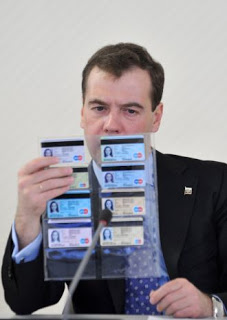
Today, Russia unveiled a universal ID card that does everything you could ever want it to do. You can use it to rent a car. It’s your credit card. It will pay your bills. It will get you an appointment at the doctor’s office. It can also put your identity at risk.
While many people love the idea of one card that does it all, very few look at the privacy risks involved. They instead see the convenience factor of having to only carry one card instead of several forms of identification. Three years from now, Russians will be using just such a card.
The UEC, which will be a kind of Swiss army knife of plastic cards and serve as a combination of a state electronic ID, driver’s license, car insurance and migration cards among other possible perks, should be available to Russians by 2014, according to the federal law.
Banks are not so sure there will be a benefit to them, so the Russian government must get them to change their minds in the next three years.
Another danger of introducing such a card is the potential for identity fraud, which often plagues countries that have introduced systems of electronic identification and rely heavily on cards similar to the UEC, experts say.
This is especially the case in Western countries, said Timur Aitov, executive director at the Association of Russian Banks. “Until recently, we have had nothing to steal,” he said.
But introducing a card that would hold comprehensive data on citizens could put them at high risk of identity theft.
Medvedev confessed that, to date, the government has not found a good answer to the question of protecting its citizens’ data and he admitted that personal information often circulates on the Internet.
While Medvedev promised that the new card “will improve the lives of tens of millions of people” by cutting through the red tape and allowing Russians to do everything from paying their gas bills to making a doctor’s appointment online, experts see ample potential for the card to turn from a magic wand into a weapon that can be used against its owner through fraud and identity theft.
Cases of fraud involving plastic debit and credit cards in Russia, according to experts, run as high as 1 percent to 1.5 percent of all cards, and not all of them are reported.
ID fraud is becoming more and more of a problem as countries continue to move towards universal IDs. Many countries do not think thoroughly about the security and identity implications before moving ahead with their schemes. Russia has three years to ensure that their IDs are as secure as possible. If they only concern themselves with interoperability between numerous agencies, they will, inevitably, ignore the security risks, harming the very people they aim to protect.
Since there are little details on how the card will be made, we will have to take Medvedev’s word that they will, in the end, only cost $9 each. There are many obstacles to overcome in such an endeavor and taking care to protect individual privacy and identities is a huge task that needs to be overcome before anyone can trust such a card.
Source: lossofprivacy.com




